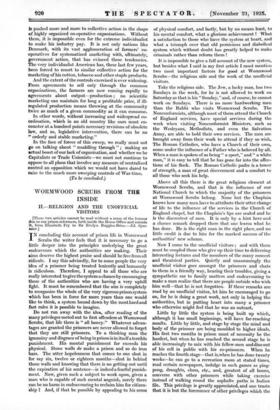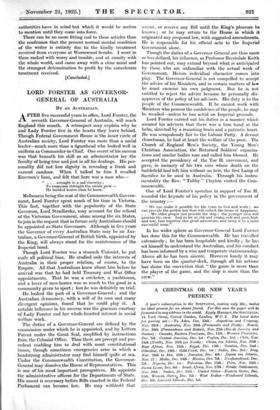WORMWOOD SCRUBS FROM THE INSIDE
II.-RELIGION AND THE UNOFFICIAL VISITORS [These two articles cannot be read without a sense of the honour due to our prison reformers, both inside the Home Office and outside it, from Elizabeth Fry to Sir Evelyn Ruggles-Brise.—Ed. Spec- tator.] IN concluding this account of prison life in Wormwood Scrubs the writer feels that it is necessary to go a little deeper into the principles underlying the great endeavours which the authorities are making. Their aims deserve the highest praise and should be free from all ridicule. I say this advisedly, for to some people the very idea of a prisoner being treated leniently and humanely is ridiculous. Therefore, I appeal to all those who are really interested to give the system a chance by encouraging those of the authorities who are having a very uphill fight. It must be remembered that the aim is completely to reorganize the whole of the very rigorous prison system which has been in force for more years than one would like to think, a system bound down by the most hard and fast rules it is possible to imagine.
Do not run away with the idea, after reading of the many privileges meted out to first offenders at Wormwood Scrubs, that life there is " all honey." Whatever advan- tages are granted the prisoners are never allowed to forget that they are still prisoners. To a thinking man the ignominy and disgrace of being in prison is in itself a terrible punishment. His mental punishment far exceeds his physical. Stone walls do make a prison and so do iron bars. The utter hopelessness that comes to one shut in for say six, twelve or eighteen months shut in behind those walls and knowing that there is no getting out until the expiration of his sentence—is indeed a fearful punish- ment. Now, given such a subject to work upon, given a man who is capable of such mental anguish, surely there can be no harm in endeavouring to reclaim him for citizen- ship ? And, if that be possible by appealing to his sense of physical comfort, and lastly, but by no means least, to his mental comfort, what a glorious achievement ! What a satisfaction to those who have the system at heart, and what a triumph over that old pernicious and diabolical system which without doubt has greatly helped to make criminals rather than reform them !
It is impossible, to give a full account of the new system, but besides what I said in my first article I must mention two most important factors for good at Wormwood Scrubs—the religious side and the work of the unofficial visitors.
Take the religious side. The Jew, a lucky man, has two Sundays in the week, for he is not allowed to work on Saturday as that is his " Sunday," and, of course, he cannot work on Sundays. There is no more hardworking man than the Rabbi who visits Wormwood Scrubs. The Nonconformists, although most of them attend the Church of England services, have special services during the week when visiting Nonconformist Ministers, such as the Wesleyans, Methodists, and even the Salvation Army, are able to hold their own services. The men are brought away from their work to attend if they so wish. The Roman Catholics, who have a Church of their own, come under the influence of a Father who is beloved by all. When a man is spoken of as being " a sport," and " a white man," it is easy to tell that he has gone far into the affec- tions of his flock. The Roman Catholic padre is a tower of strength, a man of great discernment and a comfort to all those who seek his help.
Above all this there is the great religious element at Wormwood Scrubs, and that is the influence of our National Church to which the majority of the prisoners at Wormwood Scrubs belong. None but the Chaplain knows how many men have to attribute their utter change of life to the influence of the services in the Church of England chapel, but the Chaplain's lips are sealed and he is the discreetest of men. It is only by a hint here and a chance remark dropped there that one learns what he has done. He is the right man in the right place, and no little credit is due to him for the marked success of the authorities' new scheme.
Now I come to the unofficial visitors ; and with them must be coupled those who give up their time to delivering interesting lectures and the members of the many concert and theatrical patties. Quietly and unassumingly the unofficial visitor goes amongst the prisoners and chats to them in a friendly way, hearing their troubles, giving a sympathetic ear to family matters and endeavouring to make a man realize that there are people outside who wish him well—that he is not forgotten. If these remarks are read by an unofficial visitor, let him be encouraged to go on, for he is doing a great work, not only in helping the authorities, but in putting heart into many a prisoner who otherwise might feel that he was an outcast.
Little by little the system is being built up which, although it has small beginnings, will have far-reaching results. Little by little, and stage by stage the mind and body of the prisoner are being moulded to higher ideals. His first two months in prison must of necessity be the hardest, but when he has reached the second stage he is able increasingly to mix with his fellow-men and dine out of his cell in public with his co-prisoners. When he reaches the fourth stage—that is,when he has done twenty weeks—he can go to a recreation room at stated times, read certain newspapers, indulge in such games as ping- pong, draughts, chess, etc., and, greatest of all boons, converse with other prisoners while taking exercise instead of walking round the asphalte paths in Indian file. This privilege is greatly appreciated, and one trusts that it is but the forerunner of other privileges which the authorities have in mind but which it would be useless to mention until they come into force.
There can be no more fitting end to these articles than the confession that the present normal mental condition of the writer is entirely due to the kindly treatment received from everyone at Wormwood Scrubs. I went in there racked with worry and trouble, and at enmity with the whole world, and came away with a clear mind and the strongest determination to profit by the considerate treatment received.
[Concluded.]















































 Previous page
Previous page